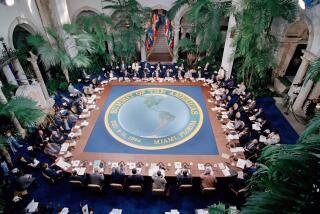Can New Thinking Put U.S., Soviets On a Smoother Path?
- Share via
MOSCOW — Because the history of Soviet-American relations has never been smooth, it is important that we try to understand the factors which have contributed to this before we take up the issues of the summit in Washington.
The United States was one of the last to establish diplomatic relations with the Soviet Union. Even after Lenin had formulated his theory of building socialism in one country, misconceptions about the aims of the Soviet state continued to be spread in the United States. What was going on in the Soviet Union at that time--the first collectivization and industrialization efforts and manifestations of Josef Stalin’s personality cult--helped the conservative forces in the United States to maintain negative attitudes about the Soviet Union.
However, U.S. businessmen wasted no time when the opportunity presented itself. Henry Ford, Armand Hammer and Averell Harriman all saw vast opportunities in trading with Soviet Russia. These business contacts became even more important for the Americans during the Great Depression. Combined with the election of President Franklin D. Roosevelt, a man with a new vision, this created the condition for the establishment of diplomatic relations between the two countries in 1933.
The international situation, especially Adolf Hitler’s coming to power in Germany, also facilitated the establishment of closer ties between the Soviet Union and the United States. It’s hard to say to what extent Roosevelt foresaw World War II, but the establishment of diplomatic relations between the Soviet Union and the United States played a major role later in the creation of an anti-Hitler alliance.
World War II was a special period for our two countries. After France fell to the Nazis, Roosevelt became convinced that America and the Soviet Union were destined to become allies. However, the United States began to doubt the Soviet Union’s ability to resist during the first months of the German invasion. Roosevelt’s representatives arrived in Moscow. At that time, Stalin acted as a skillful diplomat. I was present at his negotiations with Harriman and Harry Hopkins and saw that he succeeded in convincing the American diplomats that the war would be hard-fought and protracted, and that the Soviet Union would never surrender to Germany and would defeat her in the end.
The war showed just how much the Soviet Union and the United States could do if they worked together. At the same time, it made it clear that the numerous attempts to destroy Soviet society by force were futile. Roosevelt’s realistic world view, to my mind, helped many to understand that the two systems must co-exist. The constructive role played at that stage by Roosevelt won him great respect from the Soviet people.
After Roosevelt’s death, Harry S. Truman steered American policy in a U-turn toward confrontation. It was a bleak period for Soviet-American relations. Only American public opinion, which had been shaped at the time of the wartime alliance, prevented the American leaders from unleashing the threat of a nuclear attack on the Soviet Union while the United States was the world’s only nuclear power. By the time the Cold War had prepared the Americans for the possibility of such a conflict, the Soviet Union already had its own atom bomb. Truman had to give up his war plan, but military superiority remained the foundation of American policy.
Political ambitions are one thing, and reality is quite another. The evolution of the Reagan Administration’s views is the best example of this. At first, it made military superiority over the Soviet Union the main goal of its foreign policy.
Now that President Reagan is well into the latter half of his second term in office, we are on the threshold of a new Soviet-American summit that may result in the signing of an agreement scraping two classes of nuclear weapons--medium- and shorter-range missiles, and create conditions conducive to a 50% reduction in strategic offense armament against the background of the continued observance of the 1972 anti-ballistic missile treaty.
Because of the dramatic changes going on in the Soviet Union and between our two countries, American businessmen now feel free to show renewed interest in mutual cooperation.
Yet, the forces of doubt are still at work. In Washington one can hear demands that the United States maintain its military and nuclear might or develop alternative weapons systems. This raises the question of whether the West is capable of adopting new ways of thinking and whether it can adapt to the conditions of a world not held hostage by nuclear weapons.
Time will tell. I think both sides have learned their lessons from the experience of detente in the 1970s. The Soviet Union now takes a more realistic view of Soviet-American relations; it is no longer euphoric about the future. The American side, too, is demonstrating a more balanced approach, realizing the need to make compromises. But the most important thing is that mankind’s survival, which is at stake, seems to be a matter of growing concern. So far we have good reason to be optimistic about the December meeting.
More to Read
Sign up for Essential California
The most important California stories and recommendations in your inbox every morning.
You may occasionally receive promotional content from the Los Angeles Times.












